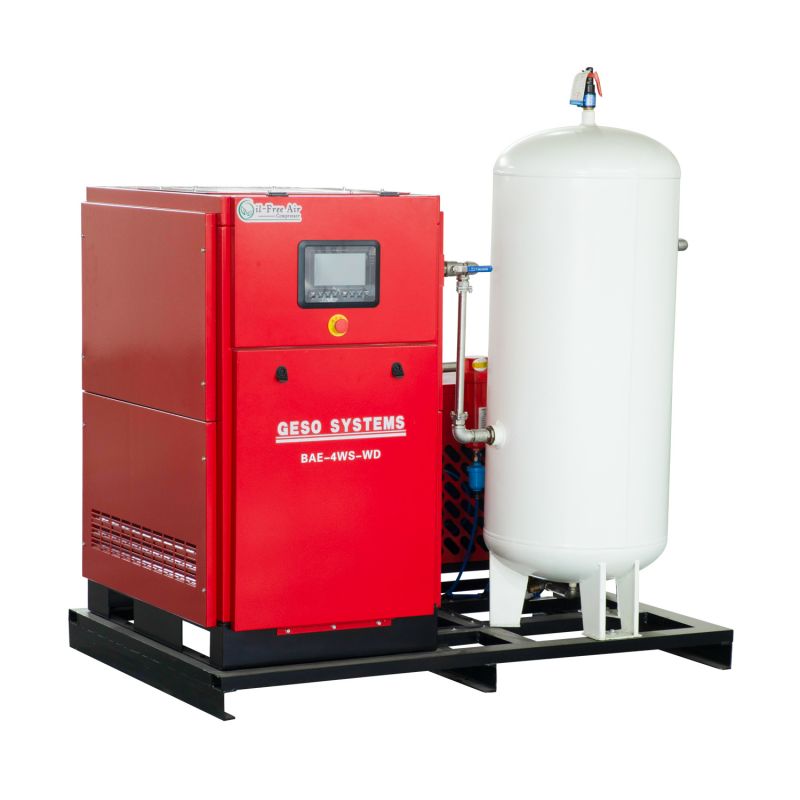Why Oil-Free Air Compressors Are the Future of Clean, Efficient Power
2025-01-21
When it comes to air compressors, the traditional oil-lubricated models have long been the standard in many industries. However, as businesses and industries are increasingly prioritizing environmental sustainability, energy efficiency, and maintenance reduction, the demand for oil-free air compressors has grown significantly. These compressors offer a cleaner, more cost-effective solution that doesn’t compromise on performance. Whether you're in manufacturing, healthcare, food processing, or any other industry that requires reliable air supply, oil-free air compressors are a game changer.
What is an Oil-Free Air Compressor?
An oil-free air compressor is a type of compressor that does not use oil for lubrication in its mechanism. Unlike conventional air compressors, which require oil to reduce friction and wear within the compressor components, oil-free models operate without the need for oil. Instead, these compressors rely on specialized designs, materials, and advanced technologies to ensure smooth and efficient operation without the risk of contamination from oil.
There are two primary types of oil-free air compressors:
1. Oil-Free Piston Compressors: These compressors use a series of pistons to compress air, and their components are carefully designed to operate without the need for lubrication.
2. Oil-Free Screw Compressors: These are commonly used in industrial applications. They employ twin-screw rotors to compress the air, and unlike their oil-lubricated counterparts, they use advanced sealing technology to prevent friction without the need for oil.
The Benefits of Oil-Free Air Compressors
1. Clean and Contaminant-Free Air
One of the most significant advantages of oil-free air compressors is the purity of the air they produce. Since no oil is involved in the compression process, there is no risk of oil contamination, which could damage sensitive equipment or harm products in industries such as food, pharmaceuticals, and electronics. In these sectors, maintaining clean air quality is critical for ensuring product safety and compliance with stringent health standards.
2. Environmentally Friendly
Oil-free compressors are an environmentally conscious choice. The absence of oil means that there are no waste products such as oil sludge to dispose of, which helps reduce the environmental impact. Additionally, these compressors typically consume less energy due to their more efficient design, contributing to lower carbon footprints for businesses looking to improve their sustainability.
3. Reduced Maintenance Costs
Traditional oil-lubricated compressors require regular oil changes and filter replacements, as well as maintenance to prevent oil leaks and contamination. Oil-free compressors, on the other hand, require significantly less maintenance, reducing both downtime and operational costs. With fewer moving parts that require lubrication, oil-free compressors tend to have longer lifespans and require fewer repairs, making them a more cost-effective option in the long run.
4. Improved Energy Efficiency
Modern oil-free compressors are engineered to operate with higher energy efficiency than their oil-lubricated counterparts. These compressors often incorporate advanced technology such as variable speed drives (VSD) to optimize energy consumption based on demand. By consuming less power while maintaining high performance, businesses can reduce their energy bills and improve overall operational efficiency.
5. Space and Flexibility
Oil-free compressors tend to be more compact than oil-lubricated models, making them ideal for businesses with limited space. Whether in small workshops, laboratories, or factories, the compact design of oil-free compressors ensures that businesses can fit them into tight spaces without sacrificing performance. Additionally, oil-free compressors are often quieter than traditional models, which is a valuable feature in noise-sensitive environments like healthcare facilities or research labs.
6. Better for Health and Safety
In industries such as food and beverage manufacturing, healthcare, and pharmaceuticals, the risk of contamination from oil is a significant concern. Oil-free air compressors eliminate this risk, making them the preferred choice for businesses that prioritize health and safety. With cleaner air, businesses can maintain higher hygiene standards and ensure the safety of both their products and workers.
Applications of Oil-Free Air Compressors
Oil-free air compressors are versatile and find applications across many industries:
- Food and Beverage: In the food industry, air is often used to convey products, power equipment, or control processes. Oil-free air ensures that there is no risk of contaminating the product with harmful oils.
- Pharmaceuticals and Healthcare: Oil-free compressors are used in cleanrooms, laboratories, and hospitals to supply breathable air or power medical equipment. Their clean air quality is crucial in environments that demand the highest hygiene standards.
- Electronics Manufacturing: Oil-free compressors are used to power machinery and tools in electronics manufacturing, where precision and cleanliness are critical.
- Industrial Applications: Many industrial sectors use oil-free compressors for applications such as air-powered tools, packaging, and automation systems, where clean, dry, and oil-free air is essential.
- Automotive: Oil-free compressors are increasingly used in automotive workshops and service centers for applications that require oil-free air for painting, sanding, and other processes.
How to Choose the Right Oil-Free Air Compressor
When selecting an oil-free air compressor, it’s important to consider several factors, including:
- Airflow Requirements: Ensure the compressor meets your required air volume (measured in CFM, or cubic feet per minute) to efficiently power your tools or equipment.
- Pressure Needs: Consider the pressure needed for your applications. Some compressors are designed to deliver higher pressures, while others are suited for standard or low-pressure tasks.
- Energy Efficiency: Look for compressors with energy-saving features, such as variable speed drives or integrated energy recovery systems, to reduce operational costs.
- Size and Portability: Depending on the space available and the mobility required, choose a model that fits your workspace and is easy to move if necessary.
- Noise Levels: In noise-sensitive environments, choose a model designed to operate quietly, as noise reduction is often a feature of modern oil-free compressors.
The Future of Oil-Free Air Compressors
As industries continue to focus on sustainability and efficiency, the demand for oil-free air compressors is expected to rise. Manufacturers are constantly innovating, developing even more efficient, quieter, and compact models with enhanced features such as smart monitoring systems, remote diagnostics, and IoT connectivity. These advancements will further improve the performance, reliability, and energy efficiency of oil-free compressors, making them an even more attractive option for businesses around the world.
Conclusion
Oil-free air compressors represent a cleaner, more efficient, and environmentally friendly solution for many industries. With benefits ranging from reduced maintenance costs and improved air quality to greater energy efficiency and environmental sustainability, these compressors are setting the standard for the future of compressed air technology. Whether you're operating in food manufacturing, healthcare, or any other industry requiring clean, reliable air, an oil-free air compressor could be the ideal choice to help streamline operations, reduce costs, and promote a healthier environment.



